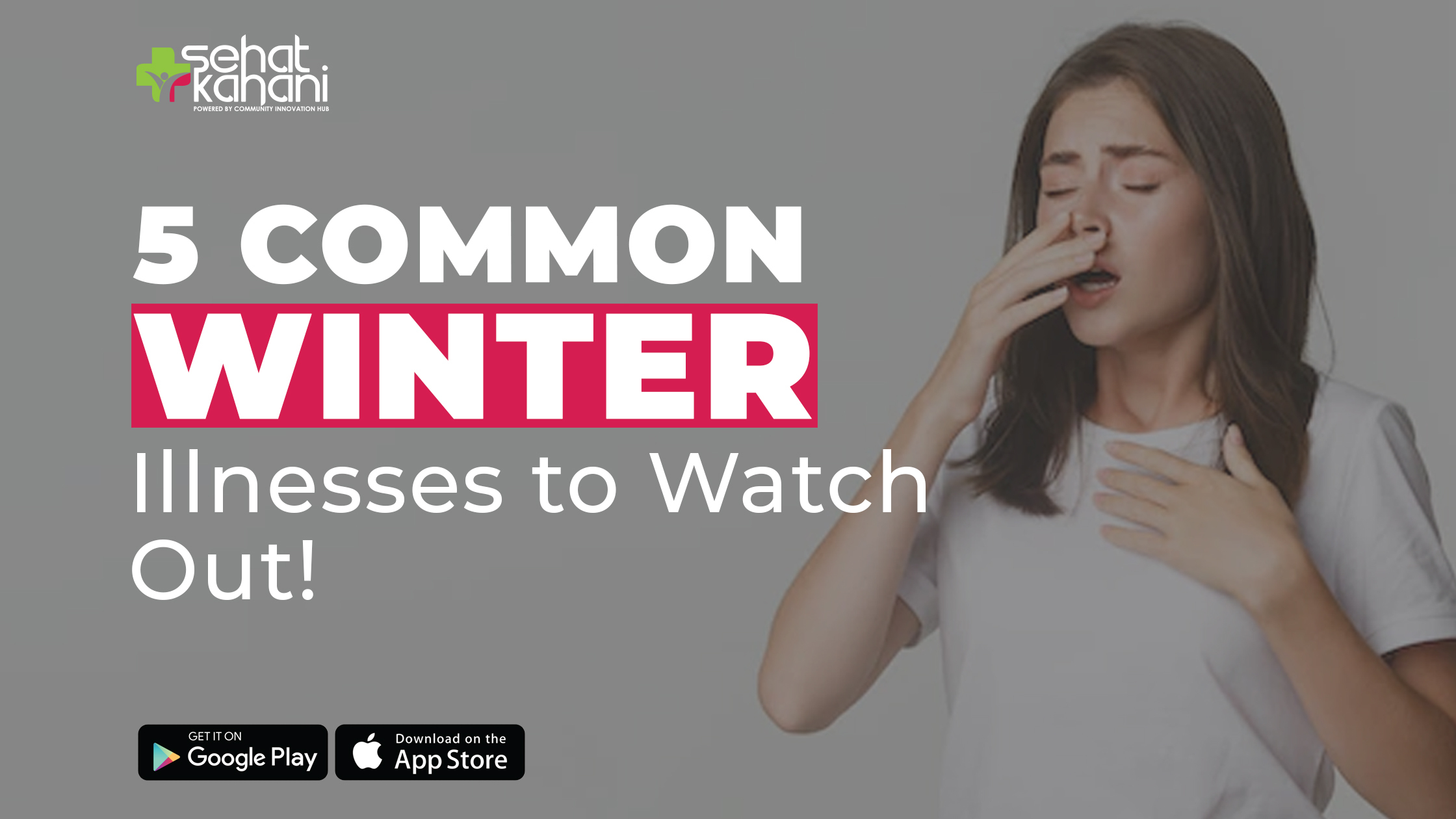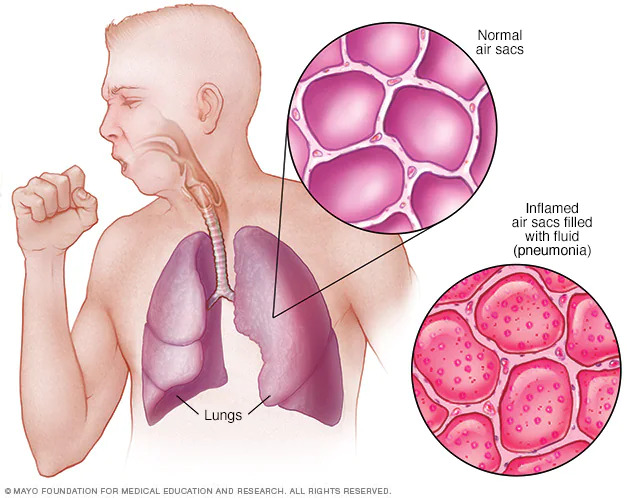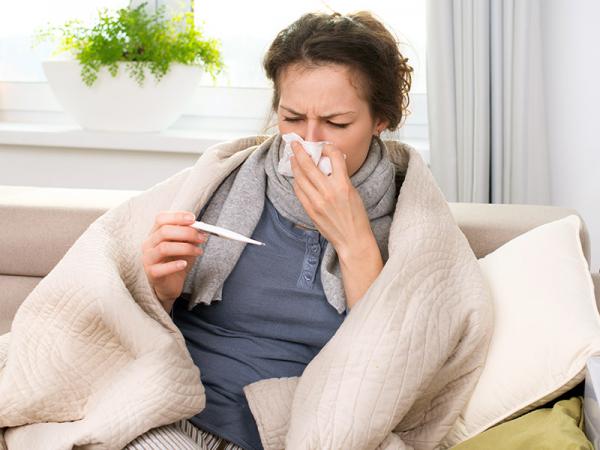
Introduction
You must have noticed the fact that you get more ill during winter. Weather changes make individuals more susceptible to illnesses as the body takes time to adjust to the new weather. However, it can be concluded that the transition from colder weather to summer is still safer than the shift from summer to winter. Cold, dry weather suppresses the resistance against diseases in people, and staying indoors increases the chances of transmission of infections.
There are various factors to look out for if you are experiencing sore throat and are sneezing more than usual. To improve your condition during winter and to safeguard your surroundings, one must have slight know-how of various illnesses that can surface during winter to ensure effective prevention and treatment.
The following blog accounts for 5 common winter illnesses detailing their symptoms and treatment. It also entails the preventions of these illnesses.
5 common winter illnesses to beware of
The five most commonly occurring winter illnesses include common colds, bronchitis, pneumonia, gastroenteritis, and the flu.
Common cold
A viral infection of the upper respiratory tract (nose and throat) causes the common cold. The average onset of common colds in healthy adults is of about two or three times a year, whereas, young toddlers may catch it more recurrently. Most common colds don’t require medical attention and are cured within a week to ten days. Like other respiratory disorders, smokers may experience symptoms that linger longer.

Symptoms
The signs of a cold usually surface after a day or three of getting exposed to the virus. Following are the signs one might experience during a common cold, note that the symptoms may vary from person to person:
- Coughing and sneezing
- Congestion
- Body aches coupled with headache
- Low-grade fever
- Runny nose
- Sore throat
- Tiredness
- Stuffy nose
With the progression of a common cold, the discharge from the nose turns thicker and might become yellowish or greenish with time. However, it is not a serious sign and cannot be taken as an indication of a bacterial infection.
If the symptoms persist for more than 3 days coupled with 101.3 ͦF or 38.5 ͦC fever, then one should consult a doctor. Other alarming signs include severe sore throat, sinus pain, wheezing, and shortness of breath.
Treatment
Common colds can be treated at home using several remedies. It is important to get an adequate amount of rest and sleep if you have a cold. Staying hydrated and gargling with salty water to soothe sore throat can also ease the symptoms of common colds.
If your symptoms persist then you can try some over-the-counter drugs including paracetamol or ibuprofen. Decongestant sprays can also be utilized for stuffy noses. It is important to note that self-medication can be harmful and for persisting symptoms, proper consultation should be taken.
Bronchitis
Bronchitis is simply the infection produced inside the bronchi. The bronchi are the essential air passages of your respiratory system which are formed by the branching of the trachea (windpipe). Bronchi inside the lungs divide into further smaller air passages called bronchioles. Since our respiratory system must stay void of dust particles to prevent irritation, mucus is produced by the walls of the bronchi to trap them.
When an infection infests the bronchi, it causes inflammation and irritation. Cool and dry weather also tends to irritate the air passages. To cope with this, the bronchi start to produce abnormal amounts of mucus which is then shifted via coughing. Smokers are more vulnerable to developing chronic bronchitis as prolonged use of tobacco cause irreversible damage to the bronchi leading to lingering inflammation.

Symptoms
The main symptoms of bronchitis include the following;
- Increased cough with chest discomfort
- White, yellow, or greenish mucus production (sputum)
- Tiredness
- Low-grade fever with chills
- Shortness of breath
Coughing from bronchitis can last for several weeks. If your cough persists for more than 3 weeks and is coupled with breathlessness and fever higher than 100.4 ͦ F, then you must consult your doctor immediately.
Treatment
Most cases of bronchitis cannot be treated with antibiotics. To ease the cough, especially at night, you can use cough syrups. The type of bronchitis which clears up within a few weeks and doesn’t require any treatment is called acute bronchitis. To accelerate the recovery, you should ensure hydration and adequate amounts of rest.
The other type of bronchitis is called chronic bronchitis, as it lasts for more than three months. Unfortunately, chronic bronchitis has no cure, however, the symptoms can be managed using cough medications. Such patients should quit smoking and avoid smoky atmospheres to avoid exacerbating their cough. Breathing exercises and pulmonary rehabilitation may also help in the management of the symptoms.
Pneumonia
Pneumonia is another respiratory disorder that is more common in winter. The disease can be defined as an infection caused in the lungs by viruses, bacteria, or fungi. The infection of the lungs can lead to the development of inflammation in the alveoli which increases the production of fluid or puss, causing breathing difficulties. Pneumonia caused by bacteria and viruses is contagious meaning that it can spread among individuals by sneezing, coughing, or by contaminated surfaces. Whereas, fungal bacteria cannot spread from person to person, instead it is spread by the atmosphere.

Symptoms
The onset of pneumonia ranges from mild to severe meaning that in some cases the symptoms of pneumonia might go unnoticed by the bearer, whereas in other instances, hospitalization is required. The severity of pneumonia depends on the way the disease is acquired, the age of the individual, and the overall health of the person. The following are some major symptoms;
- Coughing coupled with yellowish, greenish, or even bloody mucus
- Shortness of breath and shallow breathing
- Decreased energy and appetite
- Fever and sweating
- Shaking chills
- Sharp pain in the chest during coughing or deep breaths
- Vomiting and nausea in children and confusion in elderly
Individuals who are younger than the age of 2 and those who are older than 65 can be considered as the high-risk group for pneumonia. People with compromised immunity and with underlying health conditions should be more aware and cautious about the symptoms of pneumonia as it can become a life-threatening condition for them if not treated timely.
Treatment
The treatment of pneumonia depends on the type of disease one has. In most cases, pneumonia is treated at home but may require hospitalization if the symptoms are severe. Bacterial pneumonia is commonly treated using antibiotics, whereas, viral pneumonia doesn’t require any specific treatment and usually goes away with time.
To manage the symptoms, one can improve their eating habits, take an adequate amount of rest, and consume pain and fever medication if required. Oxygen therapy along with cough-relief medication can also help individuals with a severe cough.
Gastroenteritis
Gastroenteritis is a condition in which the intestines and stomach of an individual are inflamed and irritated leading to diarrhea and vomiting. Gastroenteritis, caused by bacterial or viral infection is commonly known as the “stomach flu”.

Symptoms
The most prevalent symptoms of gastroenteritis are vomiting and watery diarrhea. Other symptoms include;
- Stomach ache
- Fever
- Nausea
- Abdominal cramps
- Headache
The main factor to look out for in patients with gastroenteritis are the signs of dehydration as continued vomiting and diarrhea can cause severe dehydration. The symptom of dehydration includes;
- Dry skin and mouth
- Increased thirst
- Lightheadedness
- Decreased urination
- Tearless crying
- Decreased alertness
- Muscle weakness
Treatment
The main goal of doctors during the treatment of gastroenteritis is to prevent dehydration and treat it if already occurred due to continued diarrhea and vomiting. Children can be administered age-appropriate doses of ORS (Orally Rehydrated Solution). Adults can increase the intake of clear fluids, keeping in mind that fluids should be consumed frequently in small amounts to keep nausea at bay.
Upon the management of dehydration, the individual can gradually fix their diet by incorporating easily digestible foods into the diet including rice, toast, bananas, biscuits, chicken, etc. Dairy, alcohol, and caffeine are not easily digestible and thus should be avoided till the completion of the recovery.
The flu
Flu or influenza is an infection of the respiratory system. The onset of flu is mostly mild and is recovered within the bracket of 4 to 14 days. However, in some unfortunate circumstances, flu is accompanied by other complications which can make it life-threatening. Individuals aged above 65 and below 2 and people with chronic medical conditions including asthma, cardiovascular disorders, or diabetes are especially vulnerable to flu and their symptoms should be given immediate attention. Pregnant females and people with weak immunity should also take prompt action if they are experiencing the symptoms of the flu.

Symptoms
The initial symptoms of flu resemble that of a common cold including runny nose, sore throat, and increased sneezing. The key difference between colds and flu is that the symptoms of colds develop gradually whereas flu symptoms develop abruptly. Following are the usual symptoms of flu;
- Headache
- Pain in muscles and joints
- Fever with sweating and chills
- Cry cough
- Fatigue and weakness
- Sore throat
- Difficulty in breathing
- Stuffy or runny nose
- Vomiting and diarrhea
- Eye discomfort
Treatment
The usual treatment of flu only requires rest and hydration. Your doctor might prescribe you antiviral medication in case you are developing a severe infection which can cause multiple complications. It should be kept in mind that antiviral drugs can induce nausea and vomiting.
Ways to prevent winter illnesses
Prevention is always better than cure. One thing positive that came out of the COVID-19 pandemic was that we learned better ways to prevent the transmission of diseases, especially air-borne diseases. Since winter illnesses are foreseen, you have to be extra careful in this season especially if you have someone around with compromised immunity or other chronic conditions as even simple illnesses like the common cold can cause them a lot of trouble.
Following are some ways you can keep yourself and your family safe this winter;
Stock necessary medications
Winters tend to worsen the symptoms of people with chronic conditions. To prevent that from happening, it is essential to have refills ready. People with respiratory disorders, especially asthma, should be more careful about their prescriptions and inhalers in these dry and cold seasons.
Ensure up-to-date vaccination
Vaccinations aid greatly in preventing winter illnesses. With the modern advancements in science, vaccines are becoming safer and safer by the day which is why everyone needs to get themselves and their children vaccinated.
Maintain better hygiene
To prevent illnesses, especially infectious diseases, hygiene plays a very crucial role. Body hygiene, particularly hand hygiene, coupled with the overall cleanliness of your surroundings can help in the prevention of winter illnesses. If you don’t sweat in winter doesn’t mean you have to skip showering. Regular showering, hand washing, and keeping surfaces clean especially when someone in the house is sneezing are highly important to prevent the spread of infections.
Stay Active
Incorporating physical activity into your routine plays a beneficial role in the improvement of your overall health. Since winter generally makes people lazy, they tend to skip workouts, and staying indoors all the time can increase the chances of them getting sick. This is why it is important to incorporate physical activity in winter. It not only improves your cell functionality but also helps to keep you active and warm.
Increase ventilation in your house
One of the main reasons behind the increased onset of illnesses during winter is decreased ventilation. A closed and cozy environment might feel good in the winter but preventing all sorts of ventilation to prevent cold can increase the odds of cross-contamination. Increasing ventilation and letting air from the outside in can help to reduce contaminants, viruses, and other germs by clearing the surfaces.
When to book an appointment
You must stop relying on home remedies and over-the-counter drugs if the symptoms of your winter illness persist for more than two days. Consult a trusted doctor to get timely and effective treatment.
Understandably, leaving the comfort of your warm bed in winter especially when you are sick can be challenging. Also with seasonal allergies and infections, taking someone with you to the appointment can put them at risk as well. To prevent all these problems, you can make use of telemedicine. Use Sehat Kahani’s mobile application as a trusted platform to book an online appointment with expert doctors. In addition to the consultation, you can also book diagnostic tests from our trusted lab partners that too with amazing discounts. For testing, you can even choose to get the samples collected from your home.




